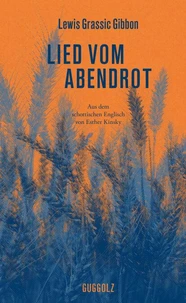A Scots Quair - The Complete Trilogy. Sunset Song, Cloud Howe & Grey Granite
Par :Formats :
Disponible dans votre compte client Decitre ou Furet du Nord dès validation de votre commande. Le format ePub est :
- Compatible avec une lecture sur My Vivlio (smartphone, tablette, ordinateur)
- Compatible avec une lecture sur liseuses Vivlio
- Pour les liseuses autres que Vivlio, vous devez utiliser le logiciel Adobe Digital Edition. Non compatible avec la lecture sur les liseuses Kindle, Remarkable et Sony
 , qui est-ce ?
, qui est-ce ?Notre partenaire de plateforme de lecture numérique où vous retrouverez l'ensemble de vos ebooks gratuitement
Pour en savoir plus sur nos ebooks, consultez notre aide en ligne ici
- Nombre de pages700
- FormatePub
- ISBN859-65--4779320-5
- EAN8596547793205
- Date de parution29/12/2023
- Protection num.Digital Watermarking
- Taille1 Mo
- Infos supplémentairesepub
- ÉditeurGOOD PRESS
Résumé
A Scots Quair - The Complete Trilogy is a remarkable literary achievement that captures the essence of Scottish life during the early 20th century. Comprising three interconnected novels'ÄîSunset Song, Cloud Howe, and Grey Granite'ÄîGibbon employs a lyrical yet poignant prose style, interweaving rich imagery with deep emotional resonance. The narrative explores themes of rural identity, social change, and the struggles of the individual against the backdrop of a transforming Scotland, providing a profound commentary on the cultural and historical milieu of the time.
Gibbon's innovative use of the Scots dialect further enhances the authenticity and depth of the characters'Äô experiences, inviting readers into the heart of the Scottish landscape. Lewis Grassic Gibbon, born Lewis Grassic Gibbon in 1901, was a pivotal figure in Scottish literature, known for his advocacy of the Scots language and culture. His own tumultuous upbringing, marked by loss and a passionate attachment to his homeland, informed his writing deeply, as he sought to articulate the complexities of Scottish identity amidst broader socio-economic changes.
Gibbon's experiences as a soldier in World War I and his keen observations of rural life provided critical context for the themes he explored in A Scots Quair. This trilogy is a must-read for anyone interested in Scottish history, literature, or social issues. Gibbon's masterful storytelling and evocative language make this comprehensive work not only an exploration of character and community but also a celebration of Scotland'Äôs rich cultural heritage.
Readers will find themselves immersed in Gibbon'Äôs world, leaving them both enlightened and deeply moved.
Gibbon's innovative use of the Scots dialect further enhances the authenticity and depth of the characters'Äô experiences, inviting readers into the heart of the Scottish landscape. Lewis Grassic Gibbon, born Lewis Grassic Gibbon in 1901, was a pivotal figure in Scottish literature, known for his advocacy of the Scots language and culture. His own tumultuous upbringing, marked by loss and a passionate attachment to his homeland, informed his writing deeply, as he sought to articulate the complexities of Scottish identity amidst broader socio-economic changes.
Gibbon's experiences as a soldier in World War I and his keen observations of rural life provided critical context for the themes he explored in A Scots Quair. This trilogy is a must-read for anyone interested in Scottish history, literature, or social issues. Gibbon's masterful storytelling and evocative language make this comprehensive work not only an exploration of character and community but also a celebration of Scotland'Äôs rich cultural heritage.
Readers will find themselves immersed in Gibbon'Äôs world, leaving them both enlightened and deeply moved.
A Scots Quair - The Complete Trilogy is a remarkable literary achievement that captures the essence of Scottish life during the early 20th century. Comprising three interconnected novels'ÄîSunset Song, Cloud Howe, and Grey Granite'ÄîGibbon employs a lyrical yet poignant prose style, interweaving rich imagery with deep emotional resonance. The narrative explores themes of rural identity, social change, and the struggles of the individual against the backdrop of a transforming Scotland, providing a profound commentary on the cultural and historical milieu of the time.
Gibbon's innovative use of the Scots dialect further enhances the authenticity and depth of the characters'Äô experiences, inviting readers into the heart of the Scottish landscape. Lewis Grassic Gibbon, born Lewis Grassic Gibbon in 1901, was a pivotal figure in Scottish literature, known for his advocacy of the Scots language and culture. His own tumultuous upbringing, marked by loss and a passionate attachment to his homeland, informed his writing deeply, as he sought to articulate the complexities of Scottish identity amidst broader socio-economic changes.
Gibbon's experiences as a soldier in World War I and his keen observations of rural life provided critical context for the themes he explored in A Scots Quair. This trilogy is a must-read for anyone interested in Scottish history, literature, or social issues. Gibbon's masterful storytelling and evocative language make this comprehensive work not only an exploration of character and community but also a celebration of Scotland'Äôs rich cultural heritage.
Readers will find themselves immersed in Gibbon'Äôs world, leaving them both enlightened and deeply moved.
Gibbon's innovative use of the Scots dialect further enhances the authenticity and depth of the characters'Äô experiences, inviting readers into the heart of the Scottish landscape. Lewis Grassic Gibbon, born Lewis Grassic Gibbon in 1901, was a pivotal figure in Scottish literature, known for his advocacy of the Scots language and culture. His own tumultuous upbringing, marked by loss and a passionate attachment to his homeland, informed his writing deeply, as he sought to articulate the complexities of Scottish identity amidst broader socio-economic changes.
Gibbon's experiences as a soldier in World War I and his keen observations of rural life provided critical context for the themes he explored in A Scots Quair. This trilogy is a must-read for anyone interested in Scottish history, literature, or social issues. Gibbon's masterful storytelling and evocative language make this comprehensive work not only an exploration of character and community but also a celebration of Scotland'Äôs rich cultural heritage.
Readers will find themselves immersed in Gibbon'Äôs world, leaving them both enlightened and deeply moved.







